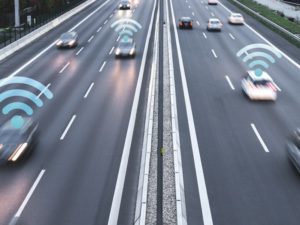Law Commission starts debate on regulating remote driving
The Law Commission of England and Wales has asked for views on the need and options for regulating remote driving on public roads.

The Law Commission’s new paper considers the existing legal framework for remote driving on roads shared with other road users
It’s published a new paper looking at the current legal status of remote driving, where a person outside a vehicle uses wireless connectivity to control a vehicle on a public road, and considering whether reforms are needed.
While technology that enables an individual to drive a vehicle from a remote location already exists today – in controlled environments such as warehouses, farms and mines – the new work considers the existing legal framework for remote driving on roads shared with other road users.
The paper focuses on remote driving where the driver does not have full line of sight and may be in a remote operations centre many miles from the vehicle – which could lead to safety challenges ranging from lost connectivity, through to a lack of situational awareness, issues from distraction and cybersecurity risks. The problem would be compounded in situations where vehicles on British roads were remotely driven from abroad.
It presents both short-term options to address problems with existing law as applied to remote driving and longer-term options for reform that would require primary legislation.
The Law Commission is seeking views on new regulations in both the short term – using existing law – and long term through reform and primary legislation, in order to address these challenges.
It also explores how other countries regulate remote driving, including Japan, Germany, Finland, the United States and Australia.
Nicholas Paines QC, public law commissioner said: “Remote driving technology is already capable of being used on our roads. We hope our issues paper can contribute to a healthy debate about the appropriate regulation of this technology and what can be done to maximise protection of road users while encouraging innovation.
“We look forward to hearing views on the challenges and possible ways to solve them.”
Jack Cousens, head of roads policy for the AA, commented on the call for evidence, saying; “Remote driving could see the novelty of controlling a child’s toy evolve into a legal form of transport. James Bond gave the world a peek into the future in 1997; the real world has finally caught up with those silver screen ambitions.
“While trials of remote driving are currently underway in Milton Keynes, extending the capability to potentially allow all drivers to sit miles away and ‘drive’ a car will need extensive testing, tough regulation and a conversation that brings the public along for the journey.”
Cousens had one more comment too: “While not wishing to stand in the way of progress, most drivers just want the basics solved, such as keeping roads pothole free.”
The new call for evidence builds on work started in 2018 alongside the Scottish Law Commission on a new legal framework to enable self-driving vehicles. The Commissions’ joint report with recommendations was published in January this year.
Views can be submitted to the Law Commission until 2 September 2022. For more details and to submit views, click here.












